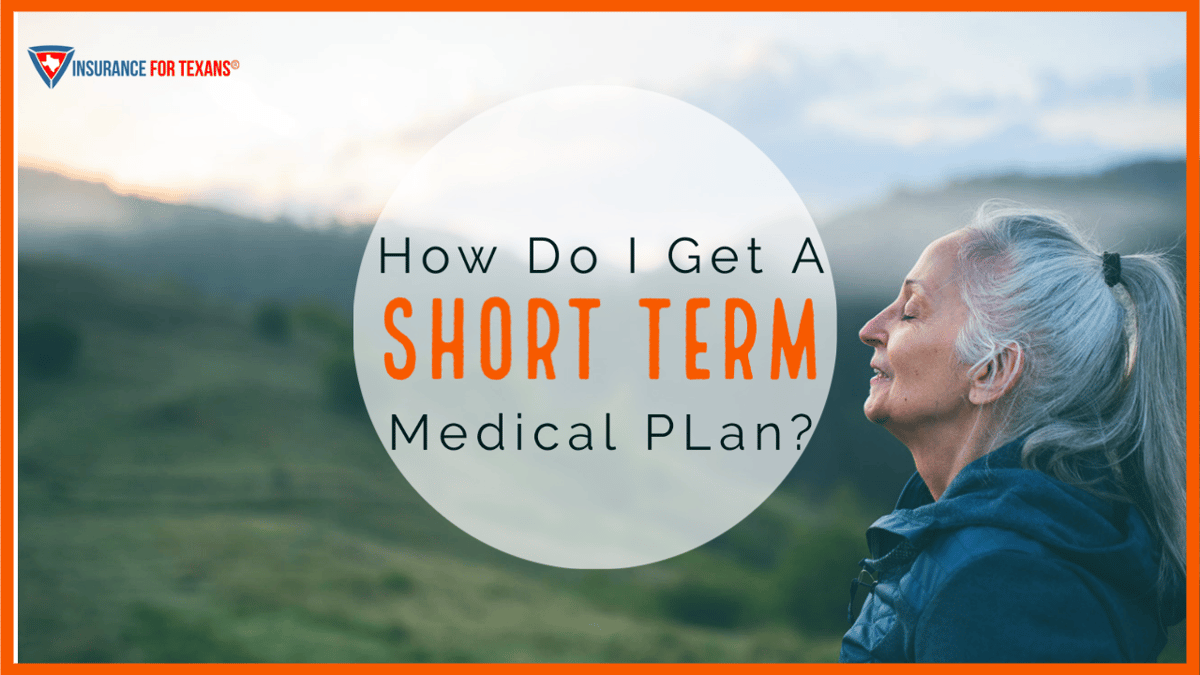As early retirees in Texas, it's crucial for couples in their 60s to have access to quality health insurance coverage that fits their needs and budget. For Texans who are in-between jobs, waiting for Medicare eligibility, or simply experiencing a coverage gap, short term medical plans may serve as a viable ACA Alternative. But what exactly are short term medical plans, and what do they offer in terms of medical coverage? In this article, we'll define short term medical plans and explore their key features and benefits for couples in their 60s.

Pros and Cons of Short Term Medical Plans
As early retirees from Texas, you may be considering different health insurance options to ensure you have coverage during this transition period between employer-based health coverage and Medicare. One option that may come to mind is a short-term medical plan. While there are some benefits to these plans, it's important to consider the pros and cons before making a decision.
Pros of Short Term Medical Plans:
One of the most significant advantages of short-term medical plans is the potentially lower monthly premium cost. Compared to traditional health insurance plans or COBRA, short-term plans can be less expensive, making them a popular choice among those who are in good health or only need coverage for a limited period. These plans can also provide coverage for emergency services.
Cons of Short Term Medical Plans:
One major drawback of short-term medical plans is the limitations in coverage for pre-existing conditions. Short-term plans don't have to offer essential benefits that are required under the Affordable Care Act, including maternity care, prescription coverage, and mental health care. Additionally, these plans may have annual limits on benefits or exclusions on coverage for certain medical expenses. That means Texans may end up with significant bills for medical treatments or procedures that aren't covered by the plan. Since coverage can be limited by these plans, you may find yourself paying out-of-pocket for treatments, office visits, or other healthcare expenses that aren't covered.
Short-term medical plans can be an appealing insurance option due to the lower monthly premiums and coverage for emergency services and medical expenses. However, it's also important to consider the drawbacks of these plans, including limitations on coverage for pre-existing conditions, essential benefits, and potential financial risks. If you're considering a short-term medical plan, make sure to review the coverage details and costs carefully to ensure it's the right choice for you.
What is Covered in a Short Term Medical Plan?
As early retirees head towards retirement, they'll undoubtedly be considering their health insurance options. Short-term medical plans present a popular option for Texans who are looking for alternatives beyond the ACA. Lets explore what is included in short-term medical plans for couples in their 60s residing in Texas.
Essential Health Benefits
If you're one of the many Texas couples nearing retirement or have already retired early, you may be curious about your health insurance options. It's important to note that short-term health insurance plans are exempt from the ACA's essential health benefits requirements. This means that unlike ACA-compliant plans, short-term plans may not provide complete coverage for medical expenses related to preventive care like diagnostic testing or annual exams. Short-term plans typically cover basic medical expenses like hospitalization, emergency care, and outpatient prescription drugs, but often exclude coverage for services such as mental health which are a part of the essential coverage required by the ACA.
If you decide to explore short-term health insurance as an alternative to ACA-compliant plans, it's important to thoroughly examine the policy restrictions and exclusions of any plan you are considering. Make sure that the plan offers the level of coverage you need for any planned medical expenses. You can still benefit from short-term medical plans, but it's essential to know exactly what is covered before purchasing one. Short-term health insurance plans may not cover all ten essential health benefits, but they can still provide coverage for certain medical expenses. When considering a short-term plan, be sure to carefully review policy restrictions and exclusions to make sure you are receiving coverage for the medical expenses you need. In a perfect world, those benefits that are covered without copay on an ACA plan will at least count towards your deductible and maximum out of pocket.
Preventive Care
Preventive care is crucial, especially for couples in their 60s who are headed towards retirement. It helps detect potential health problems early, leading to a better chance of successful treatment. Therefore, it is highly recommended to consider preventive care coverage while looking for short-term medical plans.
Since coverage for preventive care can be limited on short term plans, it is important to review specific plans to determine what is and is not covered. While some short-term plans may offer basic preventive care such as annual physical exams, immunizations, and some screenings, others may exclude preventive care coverage altogether. Thus, it is essential to fully understand the terms and conditions of the short-term medical plan that you select. Texans in their 60s who are headed towards retirement should opt for thorough research and analyses of different plans to make an informed decision.
Prescription Coverage
Short-term insurance plans may offer prescription coverage, but it is important to note that coverage can be limited. In some cases, short-term plans may only cover generic medications or may have maximum limits on prescription drug coverage. It is crucial to understand the terms and conditions when it comes to prescription coverage.
Texans, particularly early retirees, may be interested in short-term medical plans as an alternative to ACA plans. However, it is important to keep in mind that each plan has different requirements for health insurance coverage, including prescription coverage. Given the limitations for prescriptions on many short-term insurance plans, it is important to remember that there are ways to obtain your prescriptions at a reduced cost even without insurance being involved. Understanding alternatives like GoodRx.com and Cost Plus Drugs and how they function can allow you to have greater flexibility in selecting short-term policies.
Mental Health Care Coverage
When it comes to mental health care coverage, short-term medical plans often have limitations or exclusions that applicants should be aware of. Mental health parity is a concept that refers to the requirement that health insurance plans provide equal coverage for mental health services as they do for physical health services. Under the Affordable Care Act (ACA), insurance plans are required to offer mental health parity, but short-term policies may not have the same requirements.
In terms of specific mental health services that may be covered under short-term medical plans, outpatient therapy and prescription medication management may be included. However, it's important to note that the type and level of coverage can vary depending on the plan. Since Texas does not have mental health parity laws on a state level, many short-term policies do not cover mental health.
Coverage for preexisting conditions is always a subject of discussion with short-term policies. But mental health conditions or disorders may be restricted or excluded altogether under a short-term medical plan. Some plans may also require medical underwriting, which could result in certain individuals being denied coverage for pre-existing mental health conditions. It's important for individuals to thoroughly review the terms and conditions of any plan they are considering and to research mental health parity laws in their state to ensure they are receiving appropriate coverage for their needs.
Maternity Care Coverage
While this won't affect those early retirees, we do need to mention maternity care when talking about short term medical insurance. For younger families who might be in between employer-based health insurance or entrepreneurs looking for care, it's important to consider the coverage in regards to maternity care. Unfortunately, short-term medical insurance plans typically do not cover maternity care. There are some short-term policies that will cover the pregnancy, but only if it occurs after the policy effective date. This means that any expenses related to maternity care may not be covered. Because of this, it's important to note that if you are planning to become pregnant, short-term medical plans might not be a suitable option for you. Maternity care can be expensive and without proper coverage, these expenses can easily add up.
Therefore, it's crucial to carefully review the coverage offered by short-term medical plans and ensure that it includes maternity care coverage if you or your partner are planning to have or expand your family.
Emergency Services & Hospitalization Coverage
One great benefit of Short-term medical plans is that these plans offer coverage for emergency services and hospitalization. This makes them an ideal choice for early retirees in Texas or anyone else who needs coverage for a short period of time that will back stop the catastrophic events that can occur in our lives.
Coverage for emergency services typically includes care in an emergency room or urgent care center for conditions that require immediate attention. This coverage can be especially important for individuals who are active or who are at risk for a sudden illness or injury.
In addition to emergency services, short-term medical plans also offer hospitalization coverage. This includes inpatient stays and related services, such as surgery and specialized nursing care. This coverage is essential for individuals who may need to stay overnight or for an extended period of time in a hospital for necessary medical treatment.
While short-term medical plans offer good coverage for emergency services and hospitalization, it's important to understand that they come with some limitations in that they typically do not cover preexisting conditions or they may have annual dollar limits or lifetime limits on certain health benefits. As a result, it's important to make sure that your short-term coverage is not hampered by these limitations.
Who Can Benefit from Short Term Medical Plans?
Many Texans can benefit from the short-term coverage described in this article. Early retirees in Texas who are at least 62 can benefit from short-term medical plans to completely bridge the gap until Medicare kicks in at age 65. College students needing coverage while away from school for the summer can buy a three month policy. People between work based health insurance benefits can put a temporary plan in place using short-term policies. Since these plans offer competitive premiums and provide temporary health insurance coverage for emergency services, hospitalization, and other essential health benefits. They are ideal for individuals who need coverage for a short period of time and do not want to pay for the more expensive COBRA type plans. Short-term medical plans can provide peace of mind during this transitional period and ensure that early retirees or others are protected against unexpected medical expenses.

How Do I Get a Short Term Medical Plan?
If you are an early retiree or nearing retirement age, finding the right health insurance plan can be a daunting task. For Texans in particular, the options may seem limited, especially when searching for alternatives to Affordable Care Act (ACA) plans. Working with an independent insurance agent can help evaluate all of your options for health insurance which does include short-term medical insurance. But how do you go about getting a short-term medical plan? Let's take a closer look.
Enrollment Periods & Eligibility Requirements
As early retirees in Texas, it is crucial to understand the availability and eligibility criteria for short term medical plans. Short term health insurance plans provide coverage for a particular period, typically up to a year that can be renewed for a total of up to three years. However, it is essential to know the enrollment periods and eligibility requirements when applying for a short-term medical plan since different companies have different requirements.
Enrollment Periods:
The great news is that short-term policies do not require a special enrollment period. In Texas, individuals can apply for short term plans at any time throughout the year. This means that there are no specific enrollment periods for short term health plans in Texas. Unlike ACA-compliant plans, you can apply for short term plans whenever you need them.
Eligibility Requirements:
To get short term health insurance for a particular period, you must meet specific eligibility criteria. Eligibility criteria for short term health insurance plans may differ depending on the insurance provider. However, some of the standard requirements include being under the age of 65, being able to pass medical underwriting, and not having any pre-existing medical conditions.
It is important to note that short term health insurance plans are not subject to the same regulations as ACA-compliant plans. Therefore, they may not cover essential health benefits such as preventive care or mental health care. Additionally, they may have limits on annual dollar limits or limits on health benefits.
Required Documents:
When applying for a short-term health plan, you need to provide some necessary documents. While these documents are typically very limited, they may include personal identification, proof of citizenship or residency, and payment information. Some insurance providers may also require medical history or a declaration of health status.
Short term medical plans are a viable option for early retirees in Texas who need temporary medical coverage. It is essential to understand the enrollment periods, eligibility requirements, and required documents when applying for a short-term health plan. Additionally, it is crucial to review the policy details carefully to ensure that the plan meets your healthcare needs.
Monthly Premiums & Annual Dollar Limits
As Texans headed towards retirement, health insurance coverage is a significant concern. Short-term medical plans offer an alternative to ACA-compliant plans that are generally significantly cheaper but come with their limitations and restrictions. One of the critical factors to consider when choosing a short-term medical plan is the cost associated with the coverage to make sure that the value of the plan will meet your personal expectations.
Monthly premiums are the regular payments made to the insurance company for coverage. Premiums for short-term medical plans vary in Texas based on the selected coverage and deductible. The amount of coverage determines the amount of the premium, with more comprehensive coverage costing more than minimal coverage. Deductibles are also a crucial factor as a higher deductible can lead to a lower monthly premium but higher out-of-pocket costs.
Annual dollar limits are the maximum amount of medical expenses that an insurance policy will cover per year. Short term medical plans often have an annual dollar limit, which can affect the overall cost of the plan. Plans with higher annual limits will generally cost more, and those with lower limits will cost less each month.
Lifetime maximum policy benefits can also affect the cost of a short-term medical plan. Plans with a higher maximum policy benefit will offer more extensive coverage but at a higher monthly premium cost. Meanwhile, plans with low policy limits may have minimal coverage and, therefore, a lower monthly cost.
In summary, when selecting a short-term medical plan, it is important to consider both the monthly premium and annual dollar limits. The ideal plan must balance affordability and coverage to meet the individual needs of each Texan couple in their 60s headed towards retirement.
How to Choose the Right Short-Term Health Insurance Plan for You
For Texas residents who are early retirees or those approaching retirement, choosing the right short-term health insurance plan can be a daunting task. Texans can consider alternatives to the ACA-compliant plans if they qualify. Here are a few tips to guide you in choosing the right short-term health insurance plan that meets your healthcare needs and budget.
1. List Your Healthcare Needs and Short-Term Healthcare Goals
Before choosing a short-term health insurance plan, start by listing all your healthcare needs, such as prescription drug coverage, preventive care, coverage of pre-existing conditions, and essential health benefits, including preventive care, mental health, and substance use disorder services. Also, list your short-term healthcare goals, such as protecting yourself from unexpected medical emergencies and bridging the gap in coverage as you wait for Medicare benefits.
2. Research and Compare All Health Insurance Plan Options
Research and compare short-term health insurance plans from different providers in your area as well as ACA Exchange policies and even pure Catastrophic Health Coverage. Consider the policy's coverage, including annual and lifetime dollar limits, the length of the policy term, deductibles, and any limits or restrictions on pre-existing conditions, essential health benefits, and mental health and substance use disorder services. Narrow down your search by shortlisting policies that align with your healthcare needs and short-term healthcare goals.
3. Read the Policy's Fine Print
It's essential to carefully read the policy's fine print to ensure that you fully understand the policy's coverage. Identify any waiting periods, coverage gaps or restrictions that may affect your healthcare needs in the long run. Ensure that the policy includes preventive care services, emergency services, and prescription drug coverage, among others.
4. Consider Monthly Premiums and Out-of-Pocket Costs
Before choosing a short-term health insurance plan, consider the monthly premium and out-of-pocket costs, such as copays and deductibles associated with each policy. Ensure that you can afford the policy without straining your finances from a total cost at risk.
In conclusion, choosing the right short-term health insurance plan requires a careful assessment of your healthcare needs, short-term healthcare goals, and budget constraints. By following the above tips, you can find a plan that meets your healthcare needs without breaking the bank. If you would like help evaluating your needs and what is available in Texas, we recommend working with an independent insurance agent like you will find with Insurance For Texans. Click the button below to start your journey to finding the right temporary coverage or permanent solution to your health insurance journey.



